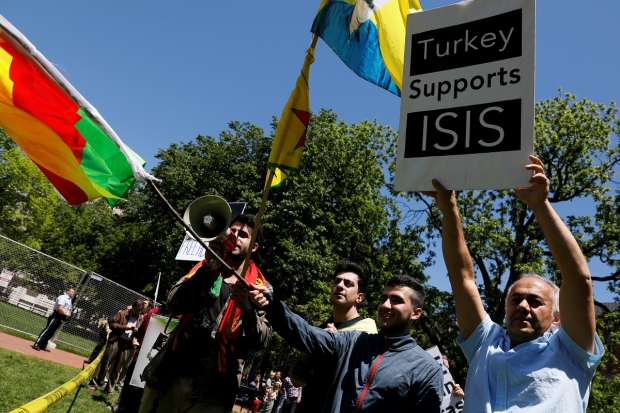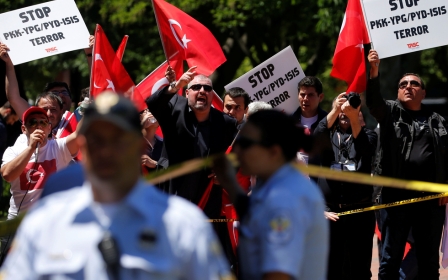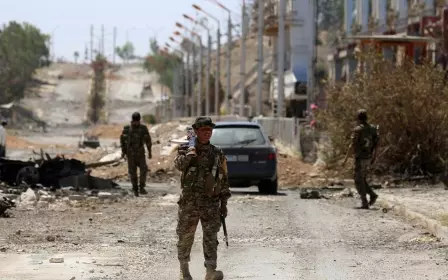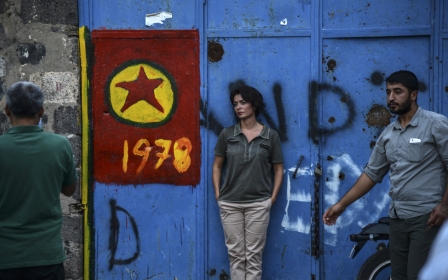Erdogan in Washington: Blood on the lawn overshadows warm words from Trump
Was Tuesday’s meeting between the American and Turkish presidents a fresh start for an ailing but crucial international alliance or yet another downward spiral in Turkish-US relations?
President Recep Tayyip Erdogan’s first meeting with President Donald Trump was planned by Ankara as a new beginning, and given far more prominence than the Turkish leader’s meeting less than two weeks earlier with Russia’s Vladimir Putin.
Unfortunately although the formal diplomatic parts of the visit did indeed, broadly speaking, pass off as planned, raising hopes among Erdogan and his officials of an improvement in Turkish-US relations, the occasion could end up being remembered outside Turkey as another downwards lurch because of a - literally - violent clash of political cultures which surrounded it.
The Turks did not get the thing they most wanted. This was a US commitment to discard the Syrian Kurdish YPG as an ally.
The initial news reports coming out of the meeting marked a definite advance on relations in the final year of the Obama era, when the Turkish president visited the US on several occasions but was repeatedly unable to secure an invitation to the White House.
On Tuesday, the two leaders met for 20 minutes and Trump announced how honoured he was to receive the leader of a country that had been a friend and ally for many decades.
Erdogan indicated that he hoped to be able to welcome the US president and his family to Turkey in the near future. The two men looked cheerful at their joint press conference although neither leader took questions.
Erdogan registered moderate discontent by politely saying that the US entente with the YPG was against the alliance. Then a two-hour working lunch followed at which teams of officials, including several of Turkey’s most senior ministers and the US secretary of state, discussed practical issues.
US and Turkish demands
The generally polite and favourable atmosphere was contrasted by Turkish news reports with the chilly reception Erdogan received in Washington in the final period of Barack Obama’s presidency.
Behind the scenes things may have been tougher. Voices are said to have been raised at a private round table session afterwards in the Turkish ambassador’s residence.
The Turks did not get the thing they most wanted: a US commitment to discard the Syrian Kurdish YPG (People’s Protection Units) as an ally. That was no surprise, but the Erdogan-Trump meeting coincided with a meeting at Ayn Issa in Syria between Brett McGurk, the US president’s special envoy to the anti-IS coalition, and senior Syrian Democratic Forces (SDF) and YPG leaders.
A western journalist claims that McGurk may have sat beside Sahin Cilo, a PKK militant with a $1m Turkish bounty on his head, at the meeting.
Back in Ankara, Turkey’s foreign minister, Mevlut Cavusoglu, revealed in an interview that his colleagues had indicated to their American counterparts that Turkey wanted McGurk replaced, since they see him as someone on good terms with terrorists.
This is the sort of diplomatic detail that is usually kept well away from journalists.
In American eyes, such a public demand is not just politically embarrassing; it suggests to US observers that Ankara does not realise the strong spirit of solidarity that now exists between the US military and their Kurdish allies in Syria after months of fighting alongside each other, months in which Turkey’s forces have remained aloof from the Americans or even unfriendly. That would probably not change even if McGurk was replaced.
If Trump, already surrounded by controversies, does heed the request to drop McGurk, he would open up yet another box of troubles for himself, and the Turkish connection is highly sensitive.
There seems to have been little progress on other matters in the White House talks, particularly on the possible extradition of Fethullah Gulen, the exiled Islamic cleric and leader whose movement the great majority of people in Turkey believe was behind the attempted military coup in July.
Finally, there was an American request to Turkey, an extremely unusual one by accustomed international standards. Trump raised the question of an American Protestant pastor, Andrew Brunson, who has been held in a Turkish prison awaiting trial on terrorism charges since October.
Brunson is accused of passing unspecified messages to Kurds and meeting clergy thought to be linked to Gulen. The prosecution apparently rests on a denunciation by a secret witness. The White House included a call for Brunson’s swift return to the United States in its “readout” after the meeting of the two presidents.
The clash
All these details add up to a difficult but not necessarily hopeless picture. But an event immediately after the White House meeting has probably overshadowed international media perceptions of the visit and generated images for which it may be long remembered.
A group of pro-Kurdish protesters gathered outside the Turkish Embassy on Washington’s “Embassy Row” and began to shout slogans calling Erdogan a dictator. They were apparently protesting the jailing of the pro-Kurdish leader Selahattin Demirtaş and 11 other members of the Turkish parliament on charges of terrorism arising from speeches they have made.
The protesters, many of whom are of course US citizens, were immediately set upon by members of the presidential entourage, some of them apparently armed.
The fighting was so fierce that 11 people were injured. Matters were made worse when Turkish embassy spokesmen clumsily defended the attack, referring to an “unauthorised demonstration”, (an unfamiliar notion to Americans) and saying that the attack had been a “legitimate” defensive response.
US officials have denounced the event in strong terms and are examining possible legal action. Turkey’s ambassador to Washington has been summoned to the State Department. Worse still, one of the most venerable figures in American politics, Senator John McCain, has called for the ambassador’s expulsion.
The Trump State Department is unlikely to do this, though it is expressing “its strongest possible concern”, but the event is an international PR disaster of unusual size, the last thing that was wanted from this visit.
- David Barchard has worked in Turkey as a journalist, consultant, and university teacher. He writes regularly on Turkish society, politics, and history, and is currently finishing a book on the Ottoman Empire in the 19th century.
The views expressed in this article belong to the author and do not necessarily reflect the editorial policy of Middle East Eye.
Photo: Donald Trump watches as Turkey's President Recep Tayyip Erdogan departs the White House, May 16, 2017 (Reuters)
New MEE newsletter: Jerusalem Dispatch
Sign up to get the latest insights and analysis on Israel-Palestine, alongside Turkey Unpacked and other MEE newsletters
Middle East Eye delivers independent and unrivalled coverage and analysis of the Middle East, North Africa and beyond. To learn more about republishing this content and the associated fees, please fill out this form. More about MEE can be found here.






